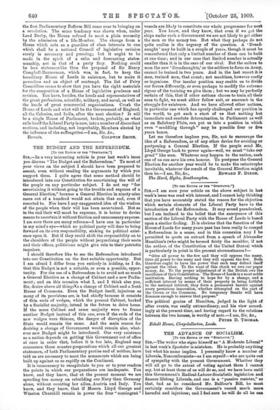[TO THE EDITOR OF THE "SPECTATOR."]
Sra,—I am sure your article on the above subject in last week's issue was read with interest, and I cannot help thinking that you have accurately stated the reason for the objection which certain elements of the Liberal Party have to the introduction of the Referendum. It may sound paradoxical, but I am inclined to the belief that the annoyance of this section of the Liberal Party with the House of Lords is based upon a similar feeling. It is obvious that the function of the House of Lords for many years past has been really to compel
a Referendum in a sense, and in this connexion may I be permitted to quote an extract from a speech of Alexander
Hamilton's (who might be termed fairly the moulder, if not the author, of the Constitution of the United States) which is particularly in point in the present circumstances ?—
" Give all power to the few and they will oppress the many. Give all power to the many and they will oppress the few. Both therefore ought to have the power that each may defend itself against the other. To the want of this check we owe our paper money, &c. To the proper adjustment of it the British owe the excellence of their Constitution. The House of Lords is a most noble institution. Having nothing to hope for by a change, and a sufficient interest by means of their property in being faithful to the national interest, they form a permanent barrier against every pernicious innovation, whether attempted on the part of the Crown or the Commons. No temporary Senate will have firmness enough to answer that purpose."
The political genius of Hamilton, judged in the light of after events, was really extraordinary, and hits view accord. ingly at the present time, and having regard to the relations between the two houses, is worthy of note.—I am, Sir, &et.,
Esholt House, Chapelallerton, Leeds. Penes D. THOMAS.










































 Previous page
Previous page